CURRENT RESEARCH PROJECTS: 2024-2026

Building resilient coastal forests through enhancing biocultural research and career pathways
PI: Leah Bremer
Well-managed coastal forests provide important climate adaptation benefits to landscapes and communities, but are often overlooked in conservation and restoration. The projects aims to improve understanding of the interactions and possible benefits of co-planted native ferns with the success of culturally valuable, drought sensitive species in a community agroforestry site in Heʻeia, Oʻahu.
Well-managed coastal forests provide important climate adaptation benefits to landscapes and communities, but are often overlooked in conservation and restoration. The projects aims to improve understanding of the interactions and possible benefits of co-planted native ferns with the success of culturally valuable, drought sensitive species in a community agroforestry site in Heʻeia, Oʻahu.
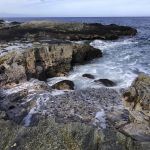
Evaluating the resilience of productive rocky intertidal ecosystems to sea-level rise using a community-based approach
PI: Haunani Kane
Sea-level rise threatens habitats of traditional foods found in the rocky intertidal zone, such as ʻopihi and limu, with unique ecological characteristics adapted to the local tidal gradient. Researchers plan to co-develop products and management tools with community organizations to improve understanding of the resilience and potential migration of healthy and productive intertidal ecosystems.
Sea-level rise threatens habitats of traditional foods found in the rocky intertidal zone, such as ʻopihi and limu, with unique ecological characteristics adapted to the local tidal gradient. Researchers plan to co-develop products and management tools with community organizations to improve understanding of the resilience and potential migration of healthy and productive intertidal ecosystems.
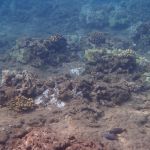
Assessing the sensitivity of coral reef accretion and bioerosion to acidification and eutrophication
PI: Andrea Kealoha
Coral reefs are threatened by a range of stressors, including those related to global climate change and local land-use, that increase dissolution and bioerosion of the reef structure. This project aims to quantify accretion and erosion rates to determine the relative impacts of different scale stressors on coral reefs.
Coral reefs are threatened by a range of stressors, including those related to global climate change and local land-use, that increase dissolution and bioerosion of the reef structure. This project aims to quantify accretion and erosion rates to determine the relative impacts of different scale stressors on coral reefs.
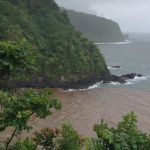
Effects of climate-driven increases in sediment delivery on coral reef ecosystem productivity and accretion: Developing predictive models for management priorities across Maui
PI: Andrea Kealoha
Climate change is increasing sediment delivery to Hawaiian coral reefs, but differences in the source, composition, and ecological impacts of sediments require research to inform management strategies. This project will investigate sediment delivery impacts on coral reef ecosystem metabolism to improve the understanding of reef resilience to multiple climate stressors and ecosystem tipping points.
Climate change is increasing sediment delivery to Hawaiian coral reefs, but differences in the source, composition, and ecological impacts of sediments require research to inform management strategies. This project will investigate sediment delivery impacts on coral reef ecosystem metabolism to improve the understanding of reef resilience to multiple climate stressors and ecosystem tipping points.
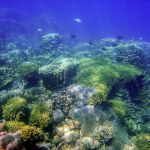
A framework to elucidate historical dynamics and support adaptive management on Hawaiian coral reefs
PI: Lisa McManus
The global decline of coral reef environments poses complex challenges for researchers, managers, and coastal communities that depend on the ecosystem services they provide. This project will produce a modeling framework that incorporates historical ecological dynamics and human-environment interactions, allowing for a more effective evaluation of possible management strategies for maintaining healthy coral reefs.
The global decline of coral reef environments poses complex challenges for researchers, managers, and coastal communities that depend on the ecosystem services they provide. This project will produce a modeling framework that incorporates historical ecological dynamics and human-environment interactions, allowing for a more effective evaluation of possible management strategies for maintaining healthy coral reefs.
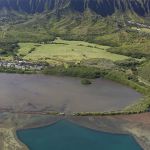
Effects of loko i‘a (fishpond) restoration on climate-dependent ecosystem dynamics in Kāneʻohe Bay, O‘ahu, Hawai‘i
PI: Lisa McManus
Recent loko iʻa (Hawaiian fishpond) restoration projects aim to rebuild their previously large role in an integrated agroecology system, increasing local fish stocks inside ponds and via beneficial spillover effects in adjacent estuaries and bays. However, with the specter of climate change, this work explores possible detrimental effects on restoration efforts and fishpond ecosystem productivity.
Recent loko iʻa (Hawaiian fishpond) restoration projects aim to rebuild their previously large role in an integrated agroecology system, increasing local fish stocks inside ponds and via beneficial spillover effects in adjacent estuaries and bays. However, with the specter of climate change, this work explores possible detrimental effects on restoration efforts and fishpond ecosystem productivity.
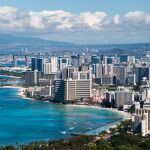
Developing design flood elevations and envisioning sea-level rise adaptation strategies for a densely developed coastal community, Waikīkī, Hawai‘i for improved outcomes for communities, economy, and the stewardship of marine resources
PI: Wendy Meguro
Sea-level rise is a critical issue worldwide, and Hawaiʻi faces billions of dollars in losses of land and structures, particularly in Waikīkī, the economic hub of Hawai‘i’s tourism industry. This project continues efforts to inform policy on the future built environment, and produce, with public input, improved conceptual architectural renderings of building SLR adaptation.
Sea-level rise is a critical issue worldwide, and Hawaiʻi faces billions of dollars in losses of land and structures, particularly in Waikīkī, the economic hub of Hawai‘i’s tourism industry. This project continues efforts to inform policy on the future built environment, and produce, with public input, improved conceptual architectural renderings of building SLR adaptation.
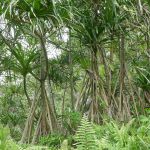
Biocultural management of coastal Pandanus forests to mitigate the effects of climate change in Hawai‘i
PI: Nina Rønsted
Pandanus forests, that once provided cultural resources and protection to Hawaiian coastlines, have been partly cleared or mixed with invasive or introduced coastal trees. This project will work with forest stewards to develop a community-based biocultural management plan that provides a robust framework of recommendations for coastal Hawaiian Pandanus forest conservation and management.
Pandanus forests, that once provided cultural resources and protection to Hawaiian coastlines, have been partly cleared or mixed with invasive or introduced coastal trees. This project will work with forest stewards to develop a community-based biocultural management plan that provides a robust framework of recommendations for coastal Hawaiian Pandanus forest conservation and management.
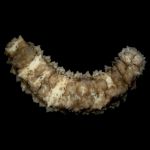
Development of gonadal maturation and spawning strategies in Hawaiian sea cucumbers
PI: Andre Seale
Sea cucumbers, including the native Hawaiian sea cucumber Stichopus horrens, have become increasingly important economically, with the rise in aquaculture efforts, but the lack of reliable reproduction techniques present a bottleneck in its production. This research aims to improve sea cucumber productivity by developing and testing hormones specific to S. horrens in controlling its spawning.
Sea cucumbers, including the native Hawaiian sea cucumber Stichopus horrens, have become increasingly important economically, with the rise in aquaculture efforts, but the lack of reliable reproduction techniques present a bottleneck in its production. This research aims to improve sea cucumber productivity by developing and testing hormones specific to S. horrens in controlling its spawning.
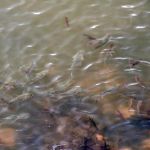
The development of environmental acclimation-based rearing strategies to optimize survival and growth in amaʻama or striped mullet, Mugil cephalus
PI: Andre Seale
Efforts to repopulate Hawaiian fishponds have encountered challenges, as natural recruitment of juvenile ʻamaʻama (striped mullet) has become unreliable and direct introduction of hatchery-raised fry has proven unsuccessful. This project tests adjusting the hatchery environment to precondition ʻamaʻama, improve their environmental tolerance, and optimize their survival and growth once introduced to the fishpond setting.
Efforts to repopulate Hawaiian fishponds have encountered challenges, as natural recruitment of juvenile ʻamaʻama (striped mullet) has become unreliable and direct introduction of hatchery-raised fry has proven unsuccessful. This project tests adjusting the hatchery environment to precondition ʻamaʻama, improve their environmental tolerance, and optimize their survival and growth once introduced to the fishpond setting.

Estimating the economic value of coastal tourism under climate change using revealed mobile phone network data
PI: Nori Tarui
Hawaiian coastlines are integral to Hawaiian tourism, a leading economic driver in the state, but are being impacted by climate change and sea-level rise. This study explores the economic repercussions of shifting sites suitable for recreation across the state to understand better the value of coastal and outdoor recreation over time under different climate scenarios.
Hawaiian coastlines are integral to Hawaiian tourism, a leading economic driver in the state, but are being impacted by climate change and sea-level rise. This study explores the economic repercussions of shifting sites suitable for recreation across the state to understand better the value of coastal and outdoor recreation over time under different climate scenarios.
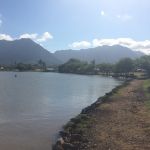
Harnessing Indigenous and local knowledge to investigate causes of decline in Hawai‘i estuarine fisheries and develop strategies to support their restoration
PI: Robert Toonen
Hawaiian fishpond baitfish populations have plummeted over decades, but causes are uncertain because Hawaiian estuaries are impacted by a range of threats including invasive species, habitat degradation, and climate change. This project investigates decline causes by documenting historical management knowledge, exploring state-wide fish abundance changes, and testing hypotheses related to habitat degradation and invasive competition.
Hawaiian fishpond baitfish populations have plummeted over decades, but causes are uncertain because Hawaiian estuaries are impacted by a range of threats including invasive species, habitat degradation, and climate change. This project investigates decline causes by documenting historical management knowledge, exploring state-wide fish abundance changes, and testing hypotheses related to habitat degradation and invasive competition.
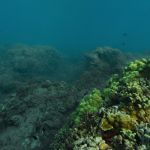
Mapping coral response to water quality stressors to improve coral restoration planning and ridge-to-reef management
PI: Lillian J. Tuttle Raz
In southwest Maui, sedimentation is a major threat to coral-reef health, but watershed management projects lack specific, measurable targets for eroded sediment reduction. To address this, researchers will work with local organizations and agencies to develop sediment stress thresholds specific to species and places, to inform both water-based restoration and land management efforts at Olowalu Reef.
In southwest Maui, sedimentation is a major threat to coral-reef health, but watershed management projects lack specific, measurable targets for eroded sediment reduction. To address this, researchers will work with local organizations and agencies to develop sediment stress thresholds specific to species and places, to inform both water-based restoration and land management efforts at Olowalu Reef.
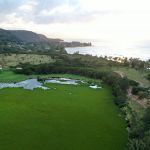
Developing an ecosystem-based monitoring program for adaptive management of Kalou lo‘i and loko wai
PI: Carmella Vizza
Wetland restoration in Hawaiʻi combines traditional Hawaiian practices, conservation, agriculture, and aquaculture, and requires community involvement and complementary research efforts for success. This project will create a place-based research program and community of practice at Kalou, O‘ahu with the North Shore Community Land Trust, delivering new insight on water quality, fish populations, and ecosystem productivity.
Wetland restoration in Hawaiʻi combines traditional Hawaiian practices, conservation, agriculture, and aquaculture, and requires community involvement and complementary research efforts for success. This project will create a place-based research program and community of practice at Kalou, O‘ahu with the North Shore Community Land Trust, delivering new insight on water quality, fish populations, and ecosystem productivity.
IN THIS SECTION
Learn more about Hawaiʻi Sea Grant Research

